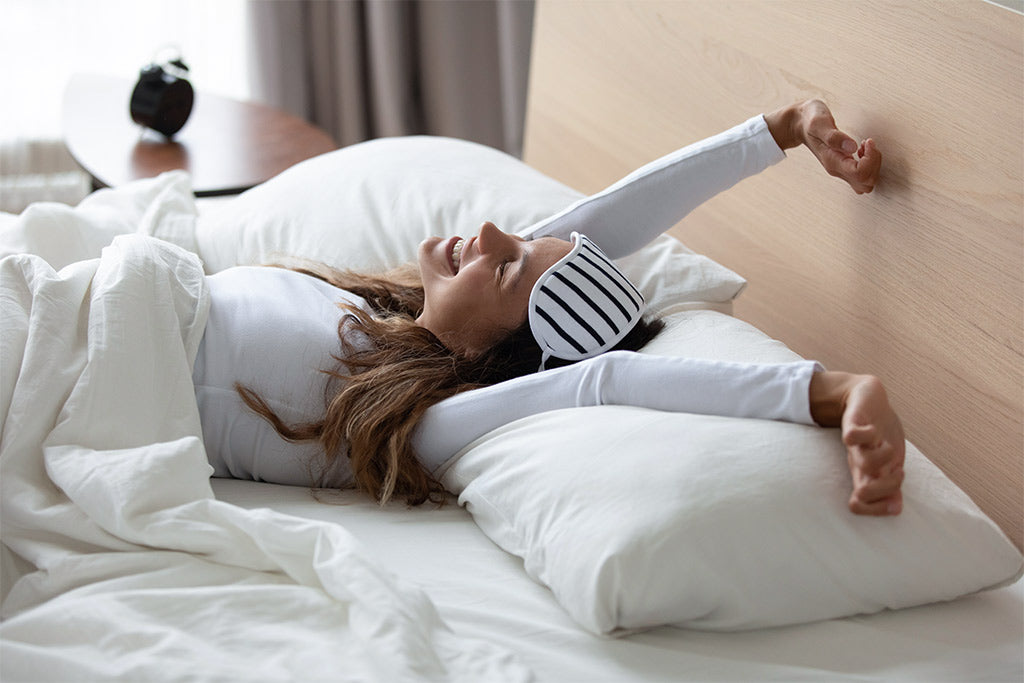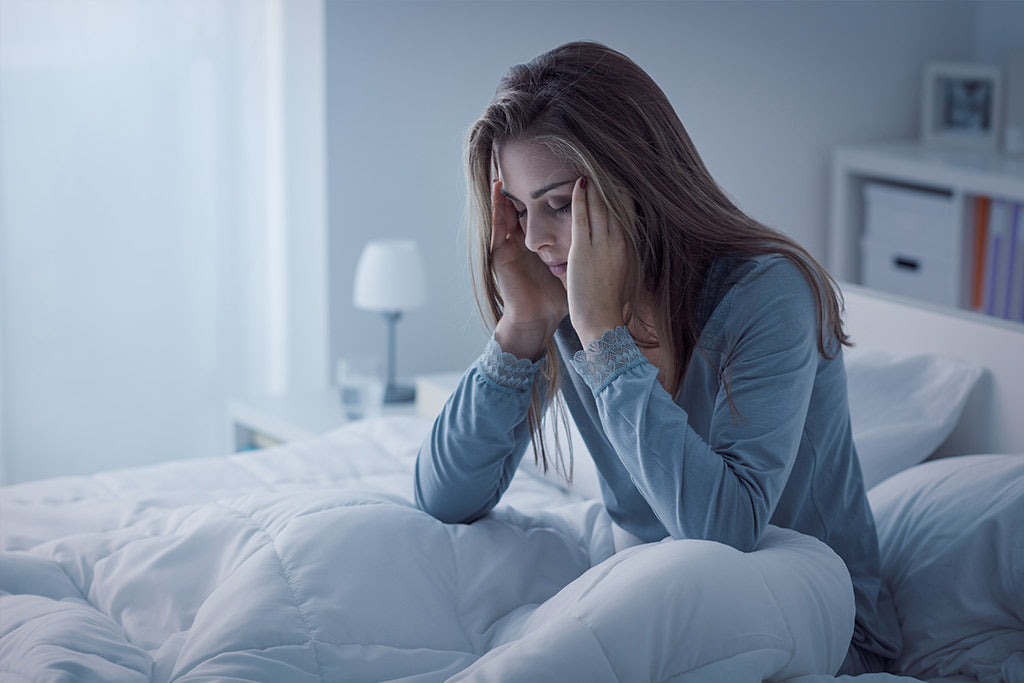It’s true. Oversleeping can present some adverse outcomes for your health and productivity.
While it’s okay to be a sleepyhead once in a while, consistently hitting snooze and oversleeping can increase the risk of certain health conditions.
There is a ton of new research investigating what happens when sleepers consistently get more than the recommended 7 - 9 hours of sleep.
The world’s largest ever sleep survey found that people who frequently sleep more than the recommended time are equally impaired as those who do not sleep enough!
Sleeping for 4 hours can have a similar effect on your mind body to sleeping for 14 hours! This explains why people tend to feel really drowsy after sleeping in.
The secret to achieving the perfect sleep is to strike a delicate balance between routine and a healthy lifestyle.

Equally as important is making sure your bedroom is strategically designed for the best rest possible.
The most critical component of your bedroom decor is your mattress, especially if you are an over-sleepover looking for a better routine. You can say goodnight to restlessness and good morning to energized wake-ups by sleeping on a memory foam mattress.
First, let’s take a deep dive into exactly how much sleep is the right amount of sleep.
What Is The Right Amount of Sleep?
To sleep in or not to sleep in? It’s a daily dilemma for some. We’re going to look at the facts about oversleeping and explore why too much time in bed might be bad for your health.
Quite recently, The National Sleep Foundation conducted a 2-year research study to revise the recommended hours of sleep required for each age category.
It may come as no surprise that the right amount of sleep for adults is 7 - 9 hours per night (weekends included)!
The outcomes of the study did not make any changes to the recommended amount of sleep for adults. However, other age groups were revised. Sleep recommendations for toddlers, preschoolers, school-aged children, and teenagers each widened by 1 hour.
The study demonstrates that different age groups need varying levels of sleep for optimal cognitive functioning. Basically, when it comes to sleep, one-size doesn't fit all. Sleep routines need to adjust as we age.
What is the right amount of sleep?
| Category | Age | Recommended hours of sleep |
| Newborns | (0-3 months) | 14-17 hours each day |
| Infants | 4-11 months | 12-15 hours |
| Toddlers | 1-2 years | 11-14 hours |
| Preschoolers | 3-5 years | 10-13 hours |
| School age children | 6-13 years | 9-11 hours |
| Teenagers | 14-17 years | 8-10 hours |
| Younger adults | 18-25 years | 7-9 hours |
| Adults | 26-64 years | 7-9 hours |
| Older adults | 65+ years | 7-8 hours |
Data source: https://www.sleepfoundation.org
Anything beyond the recommended hours of sleep is considered oversleeping. Falling short of these hours may leave you at risk of sleep deprivation.
Facts About Oversleeping
As we mentioned, too much sleep is just as bad as too little sleep.
There are specific health problems that can develop more easily when you sleep too much:
- Memory loss (trouble recalling from short term memory)
- Headaches
- Depression
- Obesity
- Type 2 diabetes
- Extra pain in the body
It is important to note that oversleeping alone cannot cause these issues. Generally, people are more susceptible to such health issues when a poor diet, lack of exercise, and poor sleep are combined.

The good news is, putting an end to oversleeping is actually quite easy when you have a routine and guide. Here are some proven ways to get the right amount of sleep:
- Stick to a schedule: when you sleep and wake up at the same time every day your body gets used to a complete sleep cycle, and you’ll find yourself naturally waking up at the same time every day.
- Eat well: a healthy diet can regulate your blood sugar levels and heart rate for rejuvenating sleep. Our top tip is to avoid sugar and caffeine before bed at all costs!
- Exercise regularly: frequent exercise boosts immunity and tires the body. Fatigue helps sleep cycles and generally creates deeper sleep.
- Sleep on a memory foam mattress: memory foam mattresses have a considerable amount of benefits that help people maintain effective sleep cycles.
- Don’t hit snooze: especially on weekdays! Hitting the snooze button on your alarm clock is one of the easiest ways to get into a bad habit of oversleeping. A simple hack that can help end your days of oversleeping is to place your alarm clock far away from your bed. Physically getting up to turn your alarm off can help condition your body to stop the snoozing!
How Your Bedroom Decor Can Promote Sleep
Yes, it’s true. Gorgeous bedroom decor and bedding have magical abilities to transform the way you sleep. If you love bedroom design, this should be music to your ears. To create a bedroom optimized for the perfect sleep experience, start with a memory foam mattress.
Upgrading to the best mattress possible is essential. After all, we spent up to one-third of our entire life in bed - so investing in incredible sleep is necessary (and you deserve it!)!

The dual purpose of a memory foam mattress as a supportive and cooling mattress will help condition your sleep cycle for deep sleep. These properties make memory foam mattresses perfect for oversleepers who want to put an end to restless nights and tired mornings.
Fall in love with the plush cloud comfort of a Puffy Memory Foam Mattress, it really feels like sleeping on a cloud!
A Memory foam mattress is the best mattress for sleepers who want to stick to a schedule because you’ll be able to fall asleep in no time, giving your body a full 7 - 9 hours of rejuvenating rest. Plus, if you are prone to back and shoulder pain, a memory foam mattress will caress your muscles and joints in all the right places.
As well as a super comfy and cozy memory foam mattress, another bedroom decor essentials for seasoned oversleepers is a weighted blanket. An ultra-soft and cooling weighted blanket has a magical ability to create instant relaxation. This means less counting sheep at bedtime, and deeper rest when you need it.
Also, consider letting the light in nice and early. As soon as you wake up, open your curtains and let the sunshine in! Lace curtains are a great bedroom decor choice when you want to brighten up your mornings while maintaining privacy.
The Final Verdict
Oversleeping presents similar symptoms to sleep deprivation and can hurt your health. The solution? Find your sleep ‘sweet-spot’ between the recommended 7 - 9 hours.
Pair your sleep schedule with a healthy lifestyle and helpful bedroom furniture like a supportive and cozy memory foam mattress and for a transformative sleep experience.
Check out Puffy mattress reviews from real customers and see how we compare with other brands.
Your Turn...
Do you experience oversleeping? Share your thoughts in the comments.
Disclaimer. We love sleep and we want you to get the best sleep possible. But we do not provide medical advice. This blog is intended for informational purposes only. It is not a substitute for professional medical info, diagnosis or treatment. Never ignore professional medical advice in seeking treatment because of something you have read on our blog.

- Award-winning comfort.
- Lifetime warranty.
- 101-night sleep trial.
- Free shipping and returns.
- 100% made in USA.

Written by Monica Chinsami, Certified Sleep Science Coach
Monica is a writer who is passionate about the connection between wellness and sleep. She believes sleep has the power to unlock our greatest potential for health and happiness. Topics she's covered range from well-being, to the latest trends in sleep health and bedroom aesthetics. Monica holds a BA in Journalism from Monash University and is a Certified Sleep Science Coach.













